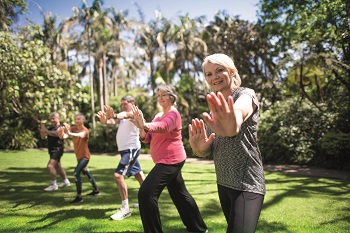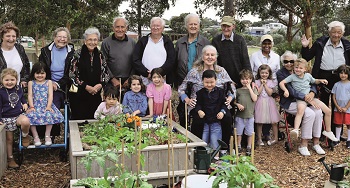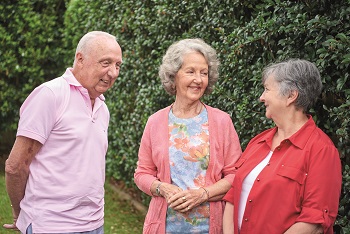Your genes, diet and a positive attitude all have a part to play in healthy ageing, says geriatrician Professor Susan Kurrle, one of the experts behind the latest ABC TV Series Old People’s Home for Teenagers.
The current average life expectancy of women in Australia is 85.2 years, and 81.5 years for men. We are living longer as a society, but are we ageing successfully? Many define successful ageing as satisfaction with our past and present life, and others focus on continued social functioning. Relative good health and general wellbeing are at the heart of both these definitions.
As our population ages, we need to explore how we can support more people to age successfully, and address some of the major obstacles to successful ageing, including dementia and loneliness. One potential solution to both of these challenges may be found through innovative models of intergenerational care, such as those piloted in the ABC TV series Old People’s Home for 4 Year Olds and now being explored in the latest season, Old People’s Home for Teenagers.
Studies of centenarians (people who live to 100 years old or more) highlight seven critical factors for successful ageing. Some we have little control over, such as our genes, while others are relatively easy to modify, including physical activity, social connection and diet.
1. Genetics
Health and longevity are hereditary. So, if your parents lived to a great age, you will likely follow in their footsteps.
2. Positive personality
People with a glass-half-full outlook on life – demonstrating a positive nature, sense of humour, optimism and adaptability – tend to live longer than pessimistic people. Cognitive behavioural therapy is one option to help people become less pessimistic.
3. Maintaining independence
This might seem obvious, but we often spend time trying to get older people to accept help they don’t need – with cooking or cleaning for example. Instead, we should be doing everything possible to support older people to continue to perform daily tasks. It’s better to remain active in older age by doing as much for ourselves as we can, with support and assistance if necessary.
4. Avoiding disease
This means monitoring your cholesterol, blood pressure and blood sugar levels and staying up to date with vaccinations as you age – including those for COVID-19 and flu as well as shingles and pneumococcal.
5. Physical activity
One Spanish study shows that it’s never too late to begin exercising, even past the age of 85, and our muscles remain adaptable until the day you die. Exercise helps with prevention and treatment of dementia, depression, heart disease, blood pressure, diabetes and many more conditions. Here’s what we should all be doing:
• At least 30 minutes of brisk walking, jogging, cycling, swimming or dancing five times weekly – get puffed enough to flush your brain with oxygenated blood and improve your physical health.
• Resistance training – either as part of a gym program or an at-home program with sit-to-stand exercises and working out with light weights.
• Balance training – easy options include, standing on one leg at the kitchen sink, or using the tandem stance, which is simply standing with one foot directly in front of the other.
6. Social connection and mental activity
Keeping mentally and socially active is essential, not just for recreation but as a way to improve our health and quality of life. Maintain relationships with family and friends, or build connections through men’s sheds, playing cards, volunteering or other social groups. Anything that keeps the brain active is helpful, including learning a new skill, language or musical instrument.
7. Eating and drinking well
New evidence in favour of the Mediterranean diet is published almost every month. The fundamental principles of the diet are:
• Eat plenty of vegetables, nuts and legumes
• Consume healthy oils, for example
• extra virgin olive oil and fish
• Relatively low consumption of meat and dairy products
• Low intake of saturated fats
• avoid processed, fast and packaged foods
• Low-to-moderate use of alcohol, two or fewer drinks a day and at least one alcohol-free day a week
To continue your healthy ageing journey with Catholic Healthcare, find out more about our Exercise, Leisure & Wellness programs click here.




